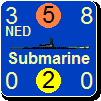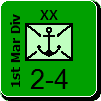juntoalmar
Posts: 601
Joined: 9/29/2013
From: Valencia
Status: offline

|
This may be a bit off topic, if so, sorry in advance, but I thought it could be interesting for some of you. Specially when there are a few people talking about how good will be to get the IA in MWiF (nudge nudge wink wink  ). ).
This Monday, starts the free online course of Game Theory from Stanford Online. You can find it here:
http://online.stanford.edu/course/game-theory-fall-2013?utm_source=email-broadcast&utm_medium=email-click&utm_campaign=october-mailer
COURSE SYLLABUS
Popularized by movies such as "A Beautiful Mind", game theory is the mathematical modeling of strategic interaction among rational (and irrational) agents. Beyond what we call 'games' in common language, such as chess, poker, soccer, etc., it includes the modeling of conflict among nations, political campaigns, competition among firms, and trading behavior in markets such as the NYSE. How could you begin to model eBay, Google keyword auctions, and peer to peer file-sharing networks, without accounting for the incentives of the people using them? The course will provide the basics: representing games and strategies, the extensive form (which computer scientists call game trees), Bayesian games (modeling things like auctions), repeated and stochastic games, and more. We'll include a variety of examples including classic games and real-world applications.
Week 1. Introduction: Introduction, overview, uses of game theory, some applications and examples, and formal definitions of: the normal form, payoffs, strategies, pure strategy Nash equilibrium, dominated strategies.
Week 2. Mixed-strategy Nash equilibria: Definitions, examples, real-world evidence.
Week 3. Alternate solution concepts: iterative removal of strictly dominated strategies, minimax strategies and the minimax theorem for zero-sum game, correlated equilibria.
Week 4. Extensive-form games: Perfect information games: trees, players assigned to nodes, payoffs, backward Induction, subgame perfect equilibrium, introduction to imperfect-information games, mixed versus behavioral strategies.
Week 5. Repeated games: Repeated prisoners dilemma, finite and infinite repeated games, limited-average versus future-discounted reward, folk theorems, stochastic games and learning.
Week 6. Coalitional games: Transferable utility cooperative games, Shapley value, Core, applications.
Week 7. Bayesian games: General definitions, ex ante/interim Bayesian Nash equilibrium.
I hope is useful for some of you!
|
 Printable Version
Printable Version







 ).
). 


















 New Messages
New Messages No New Messages
No New Messages Hot Topic w/ New Messages
Hot Topic w/ New Messages Hot Topic w/o New Messages
Hot Topic w/o New Messages Locked w/ New Messages
Locked w/ New Messages Locked w/o New Messages
Locked w/o New Messages Post New Thread
Post New Thread